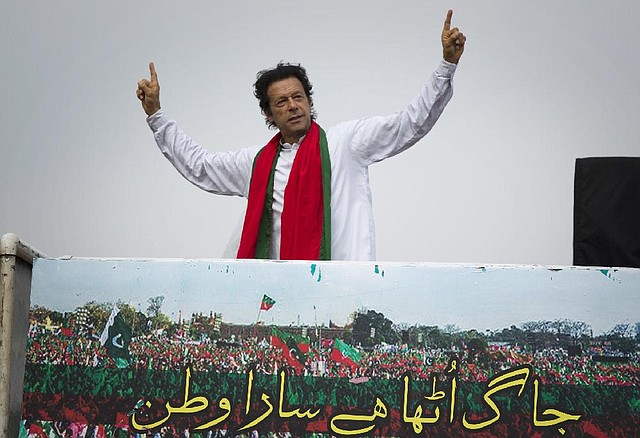Pakistani lawmakers reject boot for Sharif
Pakistan's cricketer-turned-politician Imran Khan waves to his supporters gathering near parliament in Islamabad, Pakistan, Thursday, Aug. 21, 2014. Thousands of Khan's supporters are besieging parliament for a second day Thursday to pressure Prime Minister Nawaz Sharif to resign over alleged election fraud. Writing at the bottom reads, "Country is awaken." (AP Photo/B.K. Bangash)
Friday, August 22, 2014
ISLAMABAD -- Pakistan's parliament on Thursday rejected calls for Prime Minister Nawaz Sharif's resignation as unconstitutional despite anti-government protests that have been taking place outside the assembly in the capital, Islamabad.
The resolution, supported by nearly every opposition party, marked a defeat for opposition leader Imran Khan and popular cleric Tahir-ul-Qadri, who have led week-long protests from the eastern city of Lahore to the gates of parliament calling for Sharif's ouster over accusation of voting fraud.
The assembly rejected the protesters' demands for Sharif's resignation and the dissolution of parliament, vowing to "uphold the supremacy of the constitution" and the "sovereignty of the parliament."
The U.S. Embassy appeared to support the assembly, saying "we strongly oppose any efforts to impose extra-constitutional change," while encouraging the parties to "resolve differences through peaceful dialogue in ways that strengthen Pakistan's democratic institutions and rule of law."
Khan accused Washington of taking sides in a speech to protesters, telling it not to back "stooges like Nawaz Sharif." Khan's Pakistan Tehreek-e-Insaf, the third-largest party in parliament, was not present for the vote.
The protests have been peaceful, but have raised tensions in the nuclear-armed country of 180 million people with a history of political turmoil.
Sharif's election in May of 2013 marked the first democratic transfer of power since Pakistan was carved out of India in 1947.
After a request from the country's powerful military, the government convened talks with Khan and Qadri's representatives early Thursday.
Khan, a former cricket player, suspended talks with the government later Thursday after it appointed a new police chief in the capital, in what he said was a precursor to a crackdown on the thousands of anti-government protesters.
Shah Mahmood Qureshi, a senior leader of Khan's party, said the opposition had presented six demands, including Sharif's resignation.
The other demands included electoral changes, setting up a caretaker government and removing top election officials.
The protesters also were seeking accountability for anyone found to have rigged last year's elections, which marked the first democratic transfer of power in Pakistan after a long history of coups and dictatorships.
Later on Thursday, Khan told his supporters that the government had removed the Islamabad police chief for not using force against him, and warned that the new police chief, Khalid Khattak, would follow orders to disperse the protests.
"I have suspended the talks with the government," Khan said.
He warned that his supporters would storm the prime minister's office if authorities launched any crackdown. It was not immediately clear if Qadri also was pulling out of the talks.
The government denied it had any plans to confront the protesters.
"We want to carry forward the talks to solve this issue," Information Minister Pervaiz Rashid said.
Tensions spiked Wednesday when Qadri asked his supporters to block the main gates of the parliament building and prevent lawmakers from going in or out.
He also asked supporters to prevent Sharif from walking from parliament to his nearby office, but the prime minister later used a back exit.
On Thursday, Sharif was back in parliament, where lawmakers adopted the resolution rejecting the opposition's demands.
Sharif was forced from office after a previous stint as prime minister in 1999, when the then-army chief Pervez Musharraf seized power in a coup.
A Section on 08/22/2014
